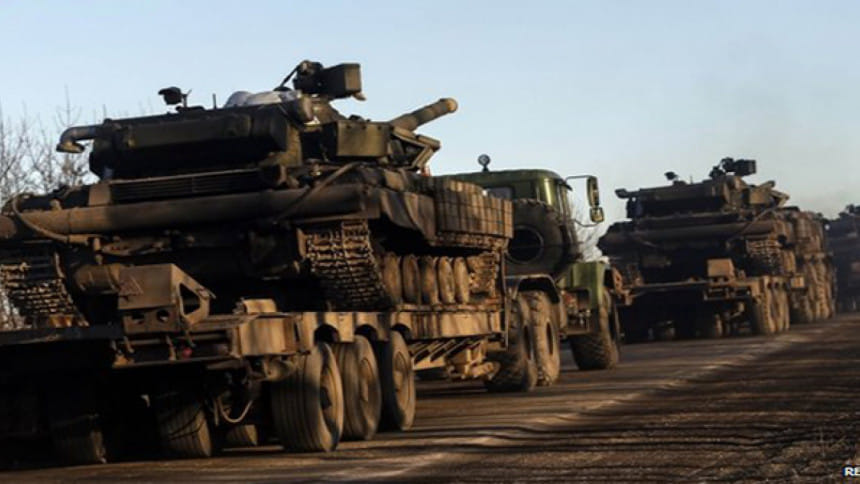Lull raises hopes for Ukraine truce

The Ukrainian army has said it suffered no casualties in 24 hours for the first time in weeks, raising hopes that a fragile ceasefire is starting to hold.
Pro-Russian rebels say they have pulled back heavy weapons from the front line in the east to comply with the truce.
But government forces dispute that and international observers want proof.
Although the ceasefire came into effect on February 15, the rebels captured the strategically important town of Debaltseve days later.
A spokesman for the Ukrainian military said one soldier had been injured during the 24-hour period, describing it as the first day with no fatalities in “at least several weeks”.
Almost 5,800 people have died since the fighting in Ukraine erupted last April, the UN has estimated, although it believes the real figure could be considerably higher.
There continued to be skirmishes, with Ukraine’s National Security Council reporting 17 rebel attacks on army positions, but the main rebel-held city of Donetsk was reported quiet.
The success of the ceasefire now rests in part on both sides’ willingness to remove artillery and tanks from the contested areas.
International monitors from the Organisation for Security and Cooperation in Europe said late on Tuesday they “cannot effectively verify” the rebels’ claim that heavy weapons have been withdrawn from the front line.
There was a “clear distinction” between the weapons being moved and “being able to report that these weapons are indeed withdrawn, and safely and securely stored”, they said.
Russia, which backs the rebels, was critical of the OSCE today, saying it did “not show proper commitment” to monitoring weapons withdrawal.
The rebels took control last week of the strategically important town of Debaltseve, which they claim was not covered by the ceasefire deal.
Under the terms of that agreement, signed earlier this month in Minsk, both sides had two weeks to pull artillery and tanks back from the contested areas, leaving a buffer zone of at least 50km between the two forces’ heavy weapons.
Ukraine initially signalled it would begin pulling back its guns on Sunday, but on Monday it said shelling from rebel positions had prevented the withdrawal.
The pullback will not now be completed until at least March 8, five days later than the original deadline. The signs of a lull at the frontline came amid worsening economic chaos for Ukraine, with its hryvnia currency plummeting 13 percent during the first two days of the week because of the instability.
Ukraine’s central bank attempted today to halt the hryvnia’s sharp decline by banning banks from buying foreign currency on behalf of their clients for the rest of the week, prompting criticism from Prime Minister Arseniy Yatseniuk.
The value of the hryvnia has fallen by at least 40 percent since the start of the year.
Meanwhile, the European Commission has called for talks to calm a dispute that has broken out over Russian gas supplies to Ukraine.
Supplies were cut off last June and restored only in December after an EU-brokered deal requiring Ukrainian pre-payment for gas.
But when Ukraine reduced its supplies to rebel-held areas last week, Gazprom began using other pipelines and Ukraine’s Naftogaz said less than half of its prepaid shipments had been piped from Russia.
Russia’s President Vladimir Putin lashed out at Ukraine today, suggesting that the authorities’ decision to cut gas supplies to the east “smacks of genocide”, for a population of some four million that he said was already suffering from a humanitarian catastrophe.

 For all latest news, follow The Daily Star's Google News channel.
For all latest news, follow The Daily Star's Google News channel. 



Comments